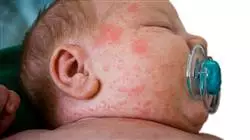University certificate
The world's largest faculty of medicine”
Introduction to the Program
TECH presents this Postgraduate diploma as a unique opportunity to perfect your medical skills in the management of children's patients with food and drug allergies under the guidance of prestigious professionals in the field of Pediatrics"

Food allergies are one of the main reasons for consultation in pediatrics, while drug allergies, although much less frequent, precede them, This hypersensitivity in infants can present itself in different ways, the most frequent being: cow's milk protein, egg, nuts, seeds, shellfish, fish and legumes. In the case of drugs, beta-lactams, NSAIDs, antibiotics and anesthetics are those that usually cause more cases of reaction.
The symptomatological picture that the patient may present depends on the response of the immune system and its degree of sensitization, however, it influences the infant's quality of life. In this sense, the role of the specialist in the early diagnosis and in the comprehensive approach to this pathology based on the latest developments in the sector is essential, which is why TECH and its team of experts in Pediatrics and Allergology have considered it necessary to develop this Postgraduate diploma in the Assessment of Food and Drug Allergy in Children. In this way, the physician will be able to get up to date with the most effective and efficient management and treatment techniques of the present, being able to update their personal vademecum in just 6 months.
It is presented as a 100% online program characterized by the possibility of access 24 hours a day and from any device with internet connection, dozens of hours of high-quality supplementary material to contextualize the content and delve into the most interesting sections and the best and most innovative syllabus on the market. For all these reasons, this program is the best opportunity to perfect your medical skills in a way that is fully compatible with your working life.
You will be able to delve into the different mechanisms of hypersensitivity to drugs and their clinical manifestations”
This Postgraduate diploma in Assessment of Food and Drug Allergy in Children contains the most complete and up-to-date scientific program on the market. The most important features include:
- The development of practical cases presented by experts in Pediatrics and Allergology
- The graphic, schematic, and practical contents with which they are created, provide scientific and practical information on the disciplines that are essential for professional practice
- Practical exercises where the self-assessment process can be carried out to improve learning
- Its special emphasis on innovative methodologies
- Theoretical lessons, questions to the expert, debate forums on controversial topics, and individual reflection work
- Content that is accessible from any fixed or portable device with an Internet connection
You will have access to clinical cases of patients that present different symptomatological conditions, so that you can perfect your approach strategies and implement the latest protocols”
The program’s teaching staff includes professionals in the sector who contribute their work experience to this training program, as well as renowned specialists from leading societies and prestigious universities.
Its multimedia content, developed with the latest educational technology, will allow the professional a situated and contextual learning, that is, a simulated environment that will provide an immersive training programmed to train in real situations.
This program is designed around Problem-Based Learning, whereby the professional must try to solve the different professional practice situations that arise throughout the program. For this purpose, the student will be assisted by an innovative interactive video system created by renowned and experienced experts.
Know in detail the allergy to cephalosporin and cross-reactivity with penicillin derivatives"

This program will give you the keys to broaden your knowledge of the epidemiology, diagnosis and treatment of patients with LTP sensitization syndrome"
Why study at TECH?
TECH is the world’s largest online university. With an impressive catalog of more than 14,000 university programs available in 11 languages, it is positioned as a leader in employability, with a 99% job placement rate. In addition, it relies on an enormous faculty of more than 6,000 professors of the highest international renown.

Study at the world's largest online university and guarantee your professional success. The future starts at TECH”
The world’s best online university according to FORBES
The prestigious Forbes magazine, specialized in business and finance, has highlighted TECH as “the world's best online university” This is what they have recently stated in an article in their digital edition in which they echo the success story of this institution, “thanks to the academic offer it provides, the selection of its teaching staff, and an innovative learning method aimed at educating the professionals of the future”
A revolutionary study method, a cutting-edge faculty and a practical focus: the key to TECH's success.
The most complete study plans on the university scene
TECH offers the most complete study plans on the university scene, with syllabuses that cover fundamental concepts and, at the same time, the main scientific advances in their specific scientific areas. In addition, these programs are continuously being updated to guarantee students the academic vanguard and the most in-demand professional skills. In this way, the university's qualifications provide its graduates with a significant advantage to propel their careers to success.
TECH offers the most comprehensive and intensive study plans on the current university scene.
A world-class teaching staff
TECH's teaching staff is made up of more than 6,000 professors with the highest international recognition. Professors, researchers and top executives of multinational companies, including Isaiah Covington, performance coach of the Boston Celtics; Magda Romanska, principal investigator at Harvard MetaLAB; Ignacio Wistumba, chairman of the department of translational molecular pathology at MD Anderson Cancer Center; and D.W. Pine, creative director of TIME magazine, among others.
Internationally renowned experts, specialized in different branches of Health, Technology, Communication and Business, form part of the TECH faculty.
A unique learning method
TECH is the first university to use Relearning in all its programs. It is the best online learning methodology, accredited with international teaching quality certifications, provided by prestigious educational agencies. In addition, this disruptive educational model is complemented with the “Case Method”, thereby setting up a unique online teaching strategy. Innovative teaching resources are also implemented, including detailed videos, infographics and interactive summaries.
TECH combines Relearning and the Case Method in all its university programs to guarantee excellent theoretical and practical learning, studying whenever and wherever you want.
The world's largest online university
TECH is the world’s largest online university. We are the largest educational institution, with the best and widest online educational catalog, one hundred percent online and covering the vast majority of areas of knowledge. We offer a large selection of our own degrees and accredited online undergraduate and postgraduate degrees. In total, more than 14,000 university degrees, in eleven different languages, make us the largest educational largest in the world.
TECH has the world's most extensive catalog of academic and official programs, available in more than 11 languages.
Google Premier Partner
The American technology giant has awarded TECH the Google Google Premier Partner badge. This award, which is only available to 3% of the world's companies, highlights the efficient, flexible and tailored experience that this university provides to students. The recognition as a Google Premier Partner not only accredits the maximum rigor, performance and investment in TECH's digital infrastructures, but also places this university as one of the world's leading technology companies.
Google has positioned TECH in the top 3% of the world's most important technology companies by awarding it its Google Premier Partner badge.
The official online university of the NBA
TECH is the official online university of the NBA. Thanks to our agreement with the biggest league in basketball, we offer our students exclusive university programs, as well as a wide variety of educational resources focused on the business of the league and other areas of the sports industry. Each program is made up of a uniquely designed syllabus and features exceptional guest hosts: professionals with a distinguished sports background who will offer their expertise on the most relevant topics.
TECH has been selected by the NBA, the world's top basketball league, as its official online university.
The top-rated university by its students
Students have positioned TECH as the world's top-rated university on the main review websites, with a highest rating of 4.9 out of 5, obtained from more than 1,000 reviews. These results consolidate TECH as the benchmark university institution at an international level, reflecting the excellence and positive impact of its educational model.” reflecting the excellence and positive impact of its educational model.”
TECH is the world’s top-rated university by its students.
Leaders in employability
TECH has managed to become the leading university in employability. 99% of its students obtain jobs in the academic field they have studied, within one year of completing any of the university's programs. A similar number achieve immediate career enhancement. All this thanks to a study methodology that bases its effectiveness on the acquisition of practical skills, which are absolutely necessary for professional development.
99% of TECH graduates find a job within a year of completing their studies.
Postgraduate Diploma in the Evaluation of Food and Drug Allergy in Children
Food Allergies are one of the most common reasons for consultation in Pediatrics, followed by Drug Allergies. These hypersensitivities in infants can manifest themselves in different ways, the most common being reactions to cow's milk protein, egg, nuts, seeds, shellfish, fish or legumes. As for drugs, beta-lactams, NSAIDs, antibiotics and anesthetics are the most commonly associated with cases of reaction. Given that the symptoms vary according to the response of the immune system and the degree of sensitivity of the patient, this Postgraduate Diploma in the Evaluation of Food and Drug Allergy in Children will provide you with all the keys.
Get updated on all aspects related to food allergens and adverse drug reactions.
TECH and its team of experts in Pediatrics and Allergology have developed the Postgraduate Diploma in the Assessment of Food and Drug Allergy in Children, with the aim of updating you in the most effective and efficient management and treatment techniques in this area. To this end, you will delve into food allergens or non-IgE mediated allergies, also examining the nutritional aspects of food allergy. All this and much more will be at your fingertips online, requiring only a device with an internet connection. Thus, you will have dozens of hours of high quality complementary material to contextualize and deepen in the most relevant topics, enjoying the best and most updated syllabus in the market.







